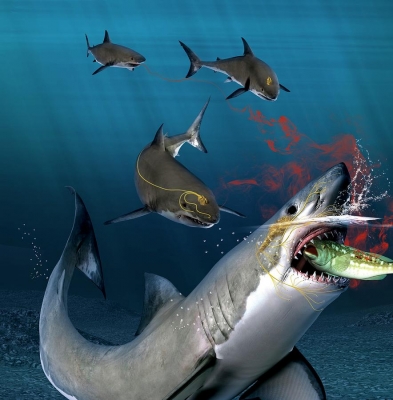
Up to two thirds of the total weight of a shark’s brain is dedicated to smell.
They’re super-sensitive to smells that are important to their survival. Including scents produced by potential predators, prey or a mate.
Some sharks can detect the blood of prey from a huge distance – one part of blood to one million parts of water. That’s equal to one teaspoon in an average sized swimming pool.
Light doesn’t travel well through water. So sharks need to maximise the amount available to help them see. With eyes positioned on the side of their head they’re able to see in almost all directions. But, their vision becomes more acute 15m from an object. It’s not until this point that sight becomes their dominant sense.
Like cats, sharks also have a ‘tapetum lucidum’. A reflective layer of shiny cells that lies behind the retina. This improves vision in low light conditions, allowing nocturnal and deep-water species to hunt effectively. It also gives their eyes a green glow in the dark.
Sharks have an acute sense of hearing and are sensitive to low-frequency signals. They’re able to track sounds and are particularly attracted to sounds made by wounded prey.
Their ears are located on either side of their head, behind the eyes. From the outside these are visible as 2 small holes. These are made up of 3 cartilage tubes filled with fluid and lined with hair cells. Sound waves cause these tiny hairs to vibrate and the brain then interprets the sound.
Credit : Shark Trust
Picture Credit : Google




